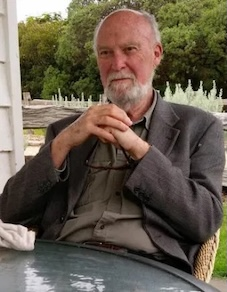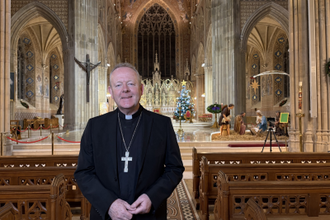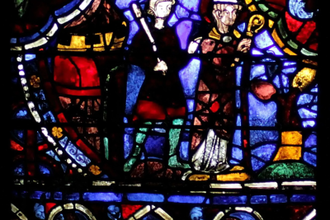Ian Linden: Down to earth after Christmas

Professor Ian Linden
A down to earth liturgical battering awaits us after Christmas. No more "Away in the Manger". Nor sweet, and posh, little voices from King's College Chapel. The wrapping paper in the bin, we hear about a stoning (St Stephen on 26th December) and more killings, on the Feast of the Holy Innocents ( 28th December). Both have resonances today.
In the Acts of the Apostles St Luke describes how Stephen, a Greek-speaking deacon, is stoned to death for delivering a long and highly critical sermon attacking his "stiff-necked" fellow Jews for rejecting Christ. Today it might be censured as antisemitism.
In St Matthew's Gospel, the only Gospel to tell this story, Herod is portrayed as wanting to kill the Christ child. But all Herod has to go on is location, Bethlehem, a small village, not far from Jerusalem. So the order goes out to kill all boys in Bethlehem under two years old. Perhaps 20 would have been killed. Collateral damage in today's terms. These days the 'acceptable' number can be calculated by algorithm.
The scale of the Bethlehem atrocity is, of course, not the main point for Matthew who is placing Jesus within the scriptural theme of Moses' escape as a baby from the Egyptian Pharaoh. Like today's authoritarian rulers Herod did in fact murder potential rivals. The Gospel tells a plausible story even if scripture scholars doubt its historical accuracy.
Well, you might say, such biblical stories are nothing compared with our own pre-Christmas diet of mass killings in Syria, the individual torture of Sarah Sharif, the rape, sexual abuse, and all manner of perversity offered up on Radio 4 News breakfast, lunch, tea and supper. In short, Radio 4, our premier news service, seems determined to convince us its audience of what the Catholic Catechism calls Original Sin. And how strange that the BBC campaign to protect children from harmful content on social media doesn't appear to recognise the prevalence of harmful content on its own radio and TV channels.
Should we be wondering whether round the world both individuals and groups of people are very little safer from murderous brutality today than they were two thousand years ago? Has humanity at heart not changed? Even asking the question draws a secular society close to some theological insights.
St Thomas Aquinas (1225-1274), described evil as "the loss" or "absence of good" following St Augustine nearly eight centuries earlier who wrote that evil is the "privation of good" (the loss of something normally present). Evil has no positive existence and is the product of the "will deficient" of human beings. So far clear enough. Though this takes some absorbing. But Aquinas in Part One of his Summa Theologiae, his training manual for peripatetic Dominican preachers, lands us amongst some tricky syllogisms and the issue gets a lot more complicated. But then the idea of evil itself is complex.
In a general sense, Aquinas says, goodness is God's gift to creation, and so to us, integral to our humanity; we are each endowed with the goodness proper to our nature. Animals, each with their specific disposition, are also endowed with their particular goodness. But ours is conditioned by the additional gift of reason and the ability to act purposefully for what we understand to be our good. In other words, there is a moral law written into human nature. Evil in human beings is the absence of that goodness, an absence that causes us to be drawn away from our proper disposition and into inhumanity.
It is difficult to find the right words to describe why and how we are drawn away from the good. The word traditionally used was Concupiscence. Thanks to some degree to St Augustine's pre-occupations, concupiscence unfortunately has tended to become a synonym of lust. St Anselm of Canterbury's (1033-1109) description is the "privation of the righteousness that any man (person) ought to possess". It suggests more widely the all-important social dimension to human goodness and evil. And for Anselm the privation is mitigated by Grace which, Catholics would say, is seen working in exemplary fashion in the lives of the saints.
Hannah Arendt captures another characteristic of evil in her controversial 1963 book Eichmann in Jerusalem: A Report on the Banality of Evil, Penguin Classics 2006. She portrayed Eichmann as a man whose horrendous crimes sprang from his not thinking. "It was sheer thoughtlessness - something by no means identical with stupidity" that drew him into the Nazi project of the Holocaust. Eichmann had no special personal traits except "an extraordinary diligence in looking out for his personal advancement". For Arendt, it was his apparent ordinariness, his banality, the absence of anything that would separate him from the Nazi herd, that led him into crimes against humanity and into a Jerusalem court room in 1962.
In her second Reith lecture this year, Dr Gwen Adshead, a distinguished forensic psychiatrist and psychotherapist who at Broadmoor treats perpetrators of extreme violence, addresses the common question "Aren't They All Evil?". That word 'Evil', she argued, should only be used as an adjective, never a noun. In some ways similar to Arendt, she spoke about how 'cognitive distortions' and 'dysregulated emotions' can create an 'evil state of mind' in otherwise ordinary people. In a profoundly Christian analysis she identifies the seven deadly sins as conditions conducive to an evil mind, placing her analysis within Aquinas' conceptual framework, the absence or loss of the good.
The perpetrators of monstrously evil deeds may be otherwise quite ordinary people. We should not be sheltered from that reality by easy accusations and easy answers. Once we blamed Adam and Eve now it is dodgy DNA. It's hard for secular-minded people to discuss the issue because so much of the available vocabulary is religious: temptation, sin, weakness, guilt, wrong, Grace. The tabloids feel free to use evil as a headline noun. The Today programme has to make do with 'inappropriate' and 'unacceptable'.
Christmas inevitably reminds us of the plight of children and refugees in conflict zones and in our own society, the sixth richest country in the world, but with 4.2 million children living below the poverty line and 117,000 homeless households in temporary accommodation. Not asleep on the hay but no way for children to be living.
War does not simply kill and maim children but damages psychologically those who survive. I encounter this damage working in a charity trying to help children in Maronite schools in a poor neighbourhood of Beirut, Lebanon's capital city. We see the consequences of poverty and trauma, from speech defects to severe behaviour problems.
Some of the Syrians in Lebanon are taking their children back to an uncertain future in Syria. What must Christmas be like in the uncertainties of Ukraine? I remember a mural in an old Serbian Orthodox church showing two women sitting around a large cooking pot preparing a meal for the family in the manger. It had survived fire-damage from the 1990s Balkans war.
My own carved wooden Malawian nativity set is as down to earth as that Serbian mural though short on sheep now. The Christmas octave reminds us that Jesus's parents had to flee Herod's violence with their refugee child, the child who came home to reveal the meaning of holiness.
Professor Ian Linden is Visiting Professor at St Mary's University, Strawberry Hill, London. A past director of the Catholic Institute for International Relations, he was awarded a CMG for his work for human rights in 2000. He has also been an adviser on Europe and Justice and Peace issues to the Department of International Affairs of the Catholic Bishops Conference of England and Wales. Ian chairs a new charity for After-school schooling in Beirut for Syrian refugees and Lebanese kids in danger of dropping out partnering with CARITAS Lebanon and work on board of Las Casas Institute in Oxford with Richard Finn OP. His latest book was Global Catholicism published by Hurst in 2009.
LINK
Professor Ian Linden: www.ianlinden.com/


















